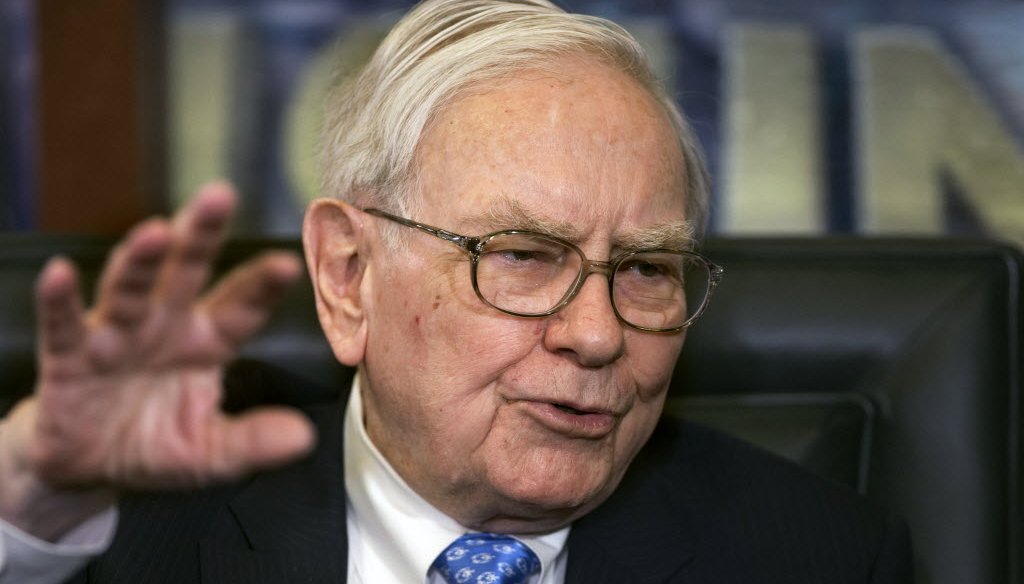Stand up for the facts!
Our only agenda is to publish the truth so you can be an informed participant in democracy.
We need your help.
I would like to contribute

Billionaire investor Warren Buffett has advocated for higher tax rates for high-income taxpayers. (AP photo)
Middle class pays higher tax rates than millionaires, Sen. Tammy Baldwin says
In his sixth State of the Union address, President Barack Obama called on Congress to raise taxes on the rich and give tax breaks to the middle class.
It was a message similar to one issued a week earlier by U.S. Sen. Tammy Baldwin, D-Wis.
"For far too long, our tax code has unfairly favored the wealthiest Americans, while middle-class families in Wisconsin have struggled to get ahead," Baldwin said in a Jan. 13, 2015 news release issued with U.S. Sen. Sheldon Whitehouse, D-R.I.
"I’m proud to once again join Senator Whitehouse to introduce the Paying a Fair Share Act, also known as the ‘Buffett rule.’ It is simply unfair to ask middle-class Americans to pay a higher tax rate than millionaires and billionaires."
Do middle-class Americans pay a higher tax rate than millionaires and billionaires?
Some do.
And some don’t.
The Buffett rule
The so-called Buffett rule refers to billionaire investor Warren Buffett. In 2011, he famously pronounced that he paid only 17.4 percent of his taxable income in federal income taxes, a lower percentage than any of his 20 employees. He proposed that federal tax rates be raised for taxpayers making more than $1 million.
Obama took note of Buffett's comments in his 2012 State of the Union speech. Later that year Baldwin and Whitehouse introduced legislation that included the so-called Buffett rule:
Under the measure, people making more than $2 million per year would pay a minimum tax rate of 30 percent, while people making between $1 million and $2 million would see their minimum tax rates increase, on a sliding scale, up to 30 percent.
The measure didn’t become law. Thus, the announcement from Baldwin and Whitehouse that they would reintroduce their legislation.
Tax rates
Hang with us here. The numbers can get kind of heavy. But it’s clear some -- though far from all -- middle-class Americans are paying higher tax rates.
To back Baldwin’s claim about the disparity in tax rates, her office cited one portion of a March 2012 analysis of the proposed Buffett rule from the nonpartisan Congressional Research Service:
A "large proportion" of millionaires pay a smaller percentage of their income in taxes than a "significant proportion" of moderate-income taxpayers, said the report, which defined moderate-income as taxpayers with taxable income below $100,000.
More specifically, roughly a quarter of all millionaires face a tax rate that is lower than the tax rate faced by 10 percent of the moderate-income taxpayers.
And on average, according to the report, the below-$100,000 taxpayers paid 35 percent of their taxable income in taxes (income and payroll), while the millionaires paid 30 percent.
Of course, some middle-class taxpayers, and some millionaires, paid much lower or much higher rates.
For instance, people in the 10th percentile of the below-$100,000 group paid a rate of 14 percent -- less than the 16 percent for the 10th percentile of the millionaire group.
But looking at the 90th percentile in each group, the below-$100,000 group paid a rate of 49 percent, more than the 37 percent in the millionaire group.
A key point:
Higher-income taxpayers who enjoy low tax rates receive a very high proportion of their income from investment income, which is taxed at low rates, the report says. Conversely, lower-income taxpayers who face relatively high tax rates get most of their income from wages, which are subject to payroll taxes.
In other words, your tax rate depends a lot on where your income comes from.
We contacted the author of the report, economist Thomas Hungerford, who is now at the liberal Economic Policy Institute. He told us that since his report was published, taxes on wealthier Americans -- including on income, capital gains and dividends -- have been raised.
But Hungerford said the thrust of his report remains accurate: A "substantial number" of middle-class Americans pay higher tax rates than some millionaires.
A more recent report, published in December 2014 by the Tax Foundation, which promotes lower tax rates, noted that the top 1 percent of taxpayers paid a higher effective income tax rate (22.8 percent) than any other group and nearly seven times higher than taxpayers in the bottom 50 percent (3.28 percent).
Our rating
Baldwin said middle-class Americans "pay a higher tax rate than millionaires and billionaires."
Some do and some don’t.
For a statement that is partially accurate, but leaves out important details, our rating is Half True.
To comment on this item, go to the Milwaukee Journal Sentinel’s web page.
Our Sources
U.S. Sen. Tammy Baldwin, news release, Jan. 13, 2015
Email exchange, U.S. Sen. Tammy Baldwin spokesman John Kraus, Jan. 20, 2015
Congressional Research Service, "An analysis of the ‘Buffett Rule’," March 28, 2012
PolitiFact National, "Proposal is mentioned in Obama’s 2014 budget," April 12, 2013
PolitiFact National, "Louie Gohmert says Obama has ‘not proposed one’ tax policy that implements ‘Buffett rule,’" Jan. 7, 2015
PolitiFact National, "Does a secretary pay higher taxes than a millionaire?" Sept. 21, 2011
Milwaukee Journal Sentinel, "Obama in State of the Union: Tax wealthy, help middle class," Jan. 20, 2015
Email interview, Tax Foundation economist Kyle Pomerleau, Jan. 20, 2015
Interview, Tax Policy Center fellow Roberton Williams, Jan. 21, 2015
Interview, Economic Policy Institute senior economist and tax and budget policy director Thomas Hungerford (author of Congresional Research Service analysis), Jan. 22, 2015
Tax Foundation, "Summary of latest federal income tax data," Dec. 22, 2014
Browse the Truth-O-Meter
More by Tom Kertscher
Middle class pays higher tax rates than millionaires, Sen. Tammy Baldwin says
Support independent fact-checking.
Become a member!
In a world of wild talk and fake news, help us stand up for the facts.
































